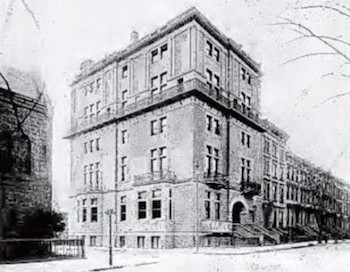Elizabeth A. Parkhill Gloucester, the wife of the Rev. Dr. James Gloucester, was an abolitionist, a supporter of the Underground Railroad, business owner, and considered one of the wealthiest women of her race at the time of her death in 1883.
Born in Virginia to a free woman, Elizabeth Parkhill moved to Philadelphia at the age of six after her mother’s death. Before her death, Elizabeth’s mother had arranged for her to live in the home of Rev. John Gloucester, founder of the first black Presbyterian Church in the United States. She was raised along with his ten children as part of the family.
By the time she was 21, Elizabeth worked as a domestic for John Cook, a prominent Philadelphia Quaker. A few years later she became reacquainted with one of the children she grew up with, James Gloucester, and after a short courtship, the two were married in 1838. James worked in Philadelphia as a teacher and Elizabeth had taken some of her savings and opened a second hand clothing shop. James, also an ordained Presbyterian minister, was offered the opportunity to start a new church and the couple relocated to New York City, New York in 1840. Together they had six children; Emma, Stephen, Elizabeth, Eloise, Charles, and Adelaide.
After moving to New York, Elizabeth opened another second hand clothing store on Seventh Avenue and later added a furniture store. She purchased the family home on Hudson Street in Manhattan but sold it for a larger property in Brooklyn. She later purchased the former Hamilton Club, on the corner of Remsen and Clinton Street, and turned it into an upscale boarding establishment called Remsen House. The family lived there as well. By the 1850s, Gloucester had become a savvy businesswoman, buying and selling profitable properties in Brooklyn and New York City.
By the start of the Civil War Gloucester was well known for her philanthropy. She continued to support St. Mary’s Street Presbyterian Church in Philadelphia, Pennsylvania even after the family moved to New York. She also donated money to purchase land and build a permanent home for Siloam Presbyterian Church in Brooklyn, New York, where her husband, James, was founder and Pastor.
Siloam became a center of antislavery activity by the end of the 1850s. It sponsored numerous abolitionist speakers including Frederick Douglass and Henry Highland Garnett. In February 1852 the abolitionist John Brown spoke at the church and stayed at the Gloucester family home for a week. The Gloucester’s gave Brown $25 towards his cause, with a note stating “do battle with that ugly foe, slavery.” Siloam was also a stop on the Underground Railroad and the church had an Underground Railroad Fund.
After the Civil War, Gloucester gave generously to organizations in the South that assisted the newly emancipated slaves. She also led white and black donors in supported the founding of the Colored Orphan’s Asylum in Weeksville, Brooklyn in 1866.
Elizabeth A. Parkhill Gloucester died of pneumonia on August 8, 1883 in Brooklyn, New York. The Brooklyn Daily Eagle claimed that she was at the time of her death, one of the richest black women in the country, worth approximately $350,000 which would be approximately $4.5 million in 2015 dollars.

